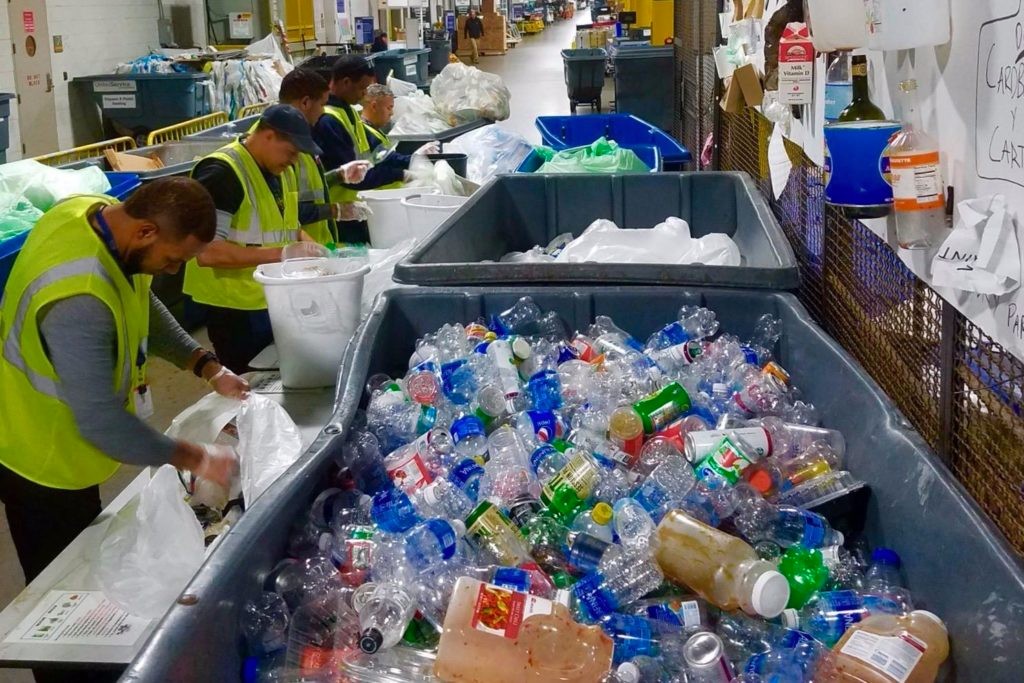
Waste Clearance for Restaurants: A Guide to Proper Disposal
Running a restaurant is no easy feat. There are a million things to look after, and one of the most important ones is waste clearance. From food scraps to packaging to hazardous waste, restaurants generate a lot of waste that needs proper disposal. But why does it matter? Proper waste clearance helps keep your restaurant clean and contributes to a healthier environment. In this blog, we will give you an overview of waste clearance for restaurants and the best practices for handling various types of waste generated by them. We will also discuss the benefits of proper waste clearance and different food waste management strategies you can implement in your restaurant. Lastly, we’ll provide insights into recycling programs that can help your restaurant reduce its carbon footprint and become more sustainable.
Overview of Waste Clearance for Restaurants
Restaurant waste clearance can be challenging, but you can do a few things to make the process go more smoothly. First, make sure you have a plan in place for what needs to be cleared out. This may include kitchen equipment, dining room furniture, and any other items that need to be removed from the premises. Next, call around different waste clearance companies to get quotes and find the best option for your needs. Schedule a time for the company to come and take care of the waste removal so that it does not disrupt your business operations.
Best Practices for Handling Restaurant Waste
There are many different ways to handle restaurant waste, but some methods are more effective than others. Here are a few best practices for handling restaurant waste:
Segregate your waste: This means keeping food waste separate from other types of waste. This makes it easier to compost or recycle food waste.
Reduce food waste: There are many ways to do this, such as using smaller plates, portioning out food ahead of time, and avoiding ordering too much food.
Compost food waste: This is one of the best ways to recycle food waste since it breaks down the organic matter and reduces the volume of waste.
By following these best practices, you can effectively reduce the amount of waste your restaurant produces and help make a difference in the environment.
Types of Waste Generated by Restaurants
There are many types of waste generated by restaurants. The most common type of waste is food waste. Other types of restaurant waste include paper, plastic, glass, metal, and grease.
- Food
Restaurants generate a lot of food waste. Most of this food waste is made up of scraps and leftovers that customers do not eat. Some of the other causes of food waste in restaurants include spoiled or expired food, cooking mistakes, and plate scrapings.
- Paper
Paper is another type of waste generated by restaurants. Restaurants all commonly throw away paper towels, napkins, menus, and to-go containers. In some cases, paper can be recycled; however, it is often thrown away.
- Plastic
Plastic is yet another type of waste generated by restaurants. Straws, condiment packets, and plastic utensils are all typically made from plastic and discarded after use. In many cases, these items cannot be recycled and end up in landfills, where they will sit for years before decomposing.
- Glass
Glass and metal are also common types of restaurant waste. Glass is often used for beverage containers, while metal is used for cans and foil wrappers. Both glass and metal can be recycled; however, they are often simply thrown away.
- Grease
Grease is a type of restaurant waste that is often overlooked but can be just as harmful as other types of waste mentioned above. Grease can come from cooking oils or fats and can build up in drains and cause blockages. It is important for restaurants to dispose of grease to avoid these issues properly. Grease can also be recycled for use in biofuels and other products.
Benefits of Waste Clearance for Restaurants
If you’re a restaurant owner, then you know how important it is to keep your establishment clean and tidy. Not only does this create a more pleasant dining experience for your customers, but it also helps to prevent the spread of bacteria and other harmful contaminants. One of the best ways to keep your restaurant clean is to clear away any waste that has accumulated regularly. Here are just a few of the benefits that regular waste clearance can provide for your restaurant:
- Improved sanitation
Regularly removing waste from your restaurant will help keep it free from bacteria and other contaminants. This will create a safer environment for both your customers and your staff.
- Reduced pests
Pests are attracted to dirty environments, so by keeping your restaurant clean, you can help to deter them. This is especially important if you serve food, as pests can contaminate food and cause illness.
- Avoidance of citations
If you don’t dispose of waste properly, you could face fines from the local authorities. Keeping on top of waste clearance will help you to avoid any such problems.
- Improved appearance
A neat and tidy restaurant is more inviting for customers than one that is cluttered with rubbish. Clearing away waste regularly can help make your restaurant more attractive to potential diners.
- Peace of mind
Regular waste clearance gives you the peace of mind that comes with knowing your restaurant is clean and safe for your customers and staff. It also helps to ensure that your establishment is meeting health and safety regulations, which can give you added confidence in your business.
Food Waste Management Strategies
There are many strategies that businesses and individuals can use to reduce the amount of food waste they generate. Some of these strategies include:
- Source reduction
This involves reducing the amount of food that is purchased or produced in the first place. For businesses, this could mean implementing portion control or reducing overproduction. For individuals, it could mean meal planning and only buying what you need from the grocery store.
- Food donation
Donating excess food to local soup kitchens or food banks is a great way to reduce waste and help those in need.
- Composting
Composting organic waste such as fruit and vegetable scraps can turn it into a valuable fertilizer for gardens or agricultural operations.
- Animal feed
Excess food that is not suitable for human consumption can be used as animal feed. This is often done with leftover restaurant meals or unsold grocery store items.
Implementing these food waste management strategies can significantly reduce the amount of food waste businesses and individuals generate. By practising source reduction, donating excess food, composting, and using excess food as animal feed, we can help reduce environmental damage and alleviate world hunger.
Recycling Programs for Restaurants
Restaurants, just like any other industry, can benefit from implementing recycling programs, which not only help the environment but also save money. Restaurant recycling programs can recycle materials like glass bottles, plastic containers, and paper. Proper sorting and disposal of different recyclable materials are necessary for the success of such programs. In addition to recycling, restaurant owners can take steps to reduce waste and promote sustainability by avoiding single-use plastics, composting food waste, and encouraging customers to participate in sustainable initiatives.
Several successful recycling programs have been implemented by restaurants globally. For example, some restaurants have installed composting bins on their premises, used reusable containers for delivery services or offered discounts for customers who bring their own reusable containers. The implementation of such programs has had a significant impact on the environment and helped promote sustainable practices in the restaurant industry.
Conclusion
Proper waste disposal is essential for restaurants to maintain a clean and safe environment and comply with regulations. By following the tips outlined in this guide, restaurant owners and managers can ensure that their waste is disposed of properly and efficiently. This not only benefits the environment but also helps to reduce costs associated with waste removal. From organizing waste bins to segregating different types of waste, taking a few simple steps can ensure your restaurant’s waste clearance is done right. If you need further assistance or have questions about proper waste disposal, don’t hesitate to consult a professional waste management company for guidance.







